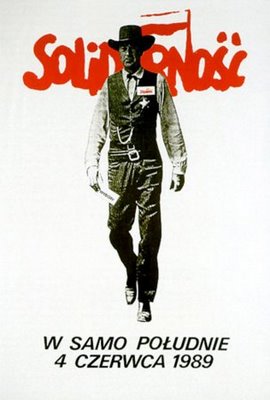Two decades of freedom
Posted on 4 June 2009

A famous 1989 poster by Tomasz Sarnecki.
Today’s a big day for Poland. Two decades ago, on Sunday 4th June 1989, the first free elections since World War II were held, resulting in a landmass victory for Solidarity and effectively putting the Communist regime to an end. Other countries of the ‘Eastern bloc’ followed suit. Five months later, the Berlin wall was demolished, and two years later, the USSR ceased to exist.
In this day of pride and satisfaction, we look back at that amazing summer of 1989 and what we’ve been able to achieve since. Among many far more serious things, we can enjoy a boundless diversity of wines, buy tea directly from Taiwan on the internet, develop private breweries and buy the latest music CDs in a range of high-street shops. Many things wouldn’t exist without Poles going to the polls two decades ago, including this blog.
Between 8 and 8:20pm today, all across Poland people raised a toast to our happy past and, hopefully, auspicious future. Chez Bońkowski, it seemed suitable to do so with a wine from our Slovenian brothers-in-freedom. The Dveri-Pax Eisenthür 2005 is a wine that couldn’t have happened two decades ago. Slovenia was still part of a country called Yugoslavia, where wine could only be bottled and sold by state-controlled cooperatives. Now this historical estate in Slovenian Styria (it was founded in the 12th century as a Benedictine abbey) has been reprivatised and with a large investment, vineyards have been renewed and a new state-of-the-art cellar established. The first wines were released in 2002 and Dveri-Pax quickly confirmed its rank as one of the leading wineries in Slovenia.
This 2005 Eisenthür single vineyard wine is a blend of 70% Sivi Pinot (local name for Pinot Gris) and 30% Šipon (local name for the Hungarian Furmint), and weighs in at 12.5%. A little capricious at first, it really gains from some airing, showing a very clean minerality from the strong volcanic terroir. It is quite Austrian in style (back in 2005 the winery’s consultant was Erich Krutzler from the famous red wine estate in Burgenland, now making wine at Weingut Pichler-Krutzler) with ripe green fruit and a clean, zesty style. It’s not a great wine, showing a bit of dilution and underripe greenness – but bear in mind 2005 was a fairly difficult vintage in this part of Europe, and the wine is fairly balanced with a good sense of place. Even its imperfections seemed to fit in today’s mood of Central European celebration.

